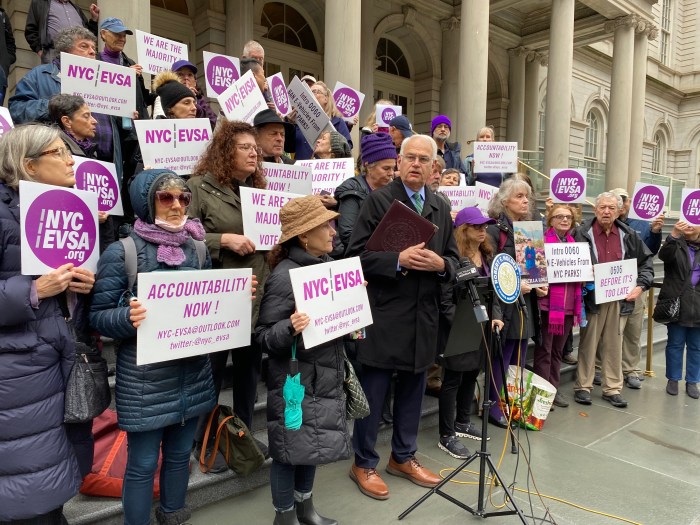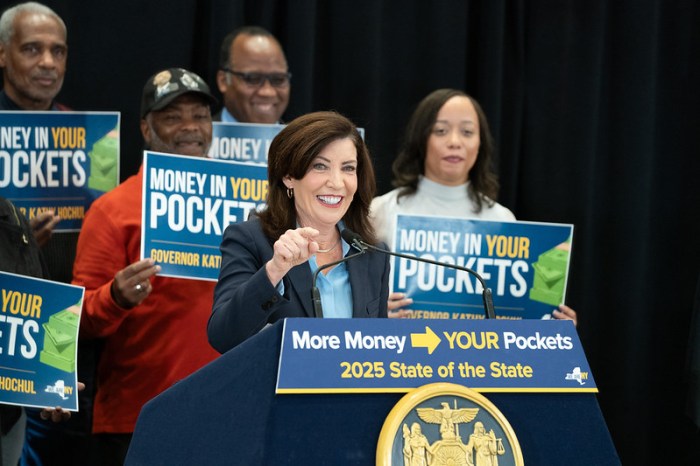As the push for rent law reforms enters its final stretch this week, mom-and-pop landlords worry that new laws could put them out of business.
“We’re coming to a crossroads where we have to think, do we want to continue doing this?” said Chris Athineos, 50, whose family owns nine apartment buildings in Bay Ridge, Brooklyn Heights and Park Slope, with a mix of rent-controlled, rent-stabilized and rent-regulated apartments.
The laws protecting tenants in about one million rent-regulated apartments in the city expire on June 15, and, with Democratic majorities in both the state Senate and Assembly, advocates have lobbied for major reforms. A package of nine bills would expand rent stabilization and end a number of policies that allow for rent increases beyond the yearly rise permitted by the city’s Rent Guidelines Board.
Two of the proposed laws would prevent landlords from permanently raising rents on rent-regulated apartments because of building-wide or individual apartment improvements — a change Athineos, who is part of a coalition of building owners called Taxpayers for an Affordable New York, said could lead to worse conditions for his tenants.
“If these bills pass, in the immediate term, I would not do any individual apartment improvements like new kitchens or new bathrooms. I just wouldn’t be able to afford to do it,” Athineos said. If he can’t afford to make upgrades to his buildings, some of which were built in the 1850s, and provide “good quality housing” for his tenants, he would consider selling them, he said.
Tenants have argued that by allowing rents to raise for improvements, some owners take advantage by inflating the costs of upgrades.
Other current laws, known as the vacancy bonus and vacancy decontrol, allow landlords to raise the price of a rent-stabilized unit by 20 percent when the apartment changes tenants and to permanently deregulate a rent-stabilized apartment when its price hits more than $2,774.76 a month. Housing advocates have argued that these laws incentivize owners to raise rents enough to make apartments unaffordable for long-term tenants, forcing them to move out and allowing the owners to charge the next tenants even more.
More than 300,000 rent-stabilized apartments have been deregulated in New York City and surrounding counties since vacancy decontrol was enacted in 1994, according to the bill that would end the policy.
“There are some bad apples in the barrel,” said John Brennan, a broker who sells rent-stabilized apartments in the city for Marcus & Millichap. “Their sole game plan is to buy the building and then shake the building up by offering some money for the tenants to leave and sometimes even by just not maintaining a safe living environment just to push tenants out.”
While he agrees with trying to stop that behavior, he doesn’t think the bills on the table will accomplish that.
“A lot of the more mom-and-pop type, I would say, responsible owners, they’re the ones that are now going to have to sell,” he said. “And the more professional-type investors that can spend money on buyouts and that have more of a game plan of shaking and building up and getting long-term tenants out, they’re the ones that are gonna be increasingly owning more and more buildings if some of these laws are passed.”
Brennan didn’t have an alternative to the rent reforms that have been proposed.
“That’s a tough question,” he said. “How to crack down on those types of buyers, but also not ruin it for the good landlord out there.”
The best thing the legislators could do is lower the real estate taxes, Athineos said, but he quickly added he knows “that’s not realistic.”
He believes a fair proposal is a program like the Senior Citizen Rent Increase Exemption and the Disability Rent Increase Exemption, which freeze rents for certain senior citizens or people with disabilities who can’t afford any increase, while also giving landlords a tax credit.
A bill proposed this year, separate from the nine rent law reforms, calls for the creation of a program called Home Stability Support, which would subsidize rent for tenants eligible for public assistance benefits and “who are also facing eviction, homelessness, or loss of housing due to domestic violence or hazardous living conditions.”
But that law doesn’t appear to be a substitute for the rent law reforms — State Sen. Liz Krueger, who sponsored the HSS bill in the Senate, told THE CITY she will also stand firm on the other bills.
“The landlords may not like rent regulations, but there is no trade-off between the Housing Stability Support program,” she said.

































